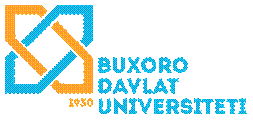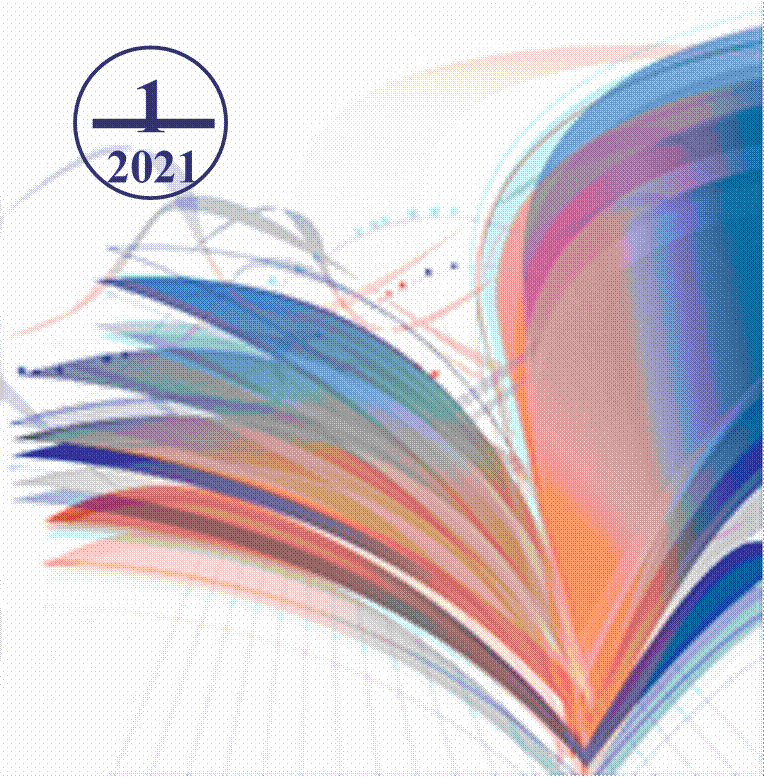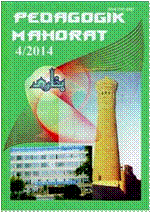


 PEDAGOGIK
ISSN
2181-6833 MAHORAT
PEDAGOGIK
ISSN
2181-6833 MAHORAT
1 (77) 2021 PEDAGOGIK MAHORAT
ISSN 2181-6883
PEDAGOGIK MAHORAT
Ilmiy-nazariy va metodik jurnal
1-son (2021-yil, fevral)
Jurnal 2001-yildan chiqa boshlagan
Buxoro – 2021
1
PEDAGOGIK MAHORAT
Ilmiy-nazariy va metodik jurnal
2021, № 1
 Jurnal Oʻzbekiston
Respublikasi Vazirlar Mahkamasi huzuridagi OAK Rayosatining 2016-yil
29-dekabrdagi qarori bilan pedagogika va psixologiya
fanlari boʻyicha dissertatsiya ishlari natijalari
yuzasidan ilmiy maqolalar chop etilishi lozim boʻlgan
zaruruiynashrlar roʻyxatiga kiritilgan.
Jurnal Oʻzbekiston
Respublikasi Vazirlar Mahkamasi huzuridagi OAK Rayosatining 2016-yil
29-dekabrdagi qarori bilan pedagogika va psixologiya
fanlari boʻyicha dissertatsiya ishlari natijalari
yuzasidan ilmiy maqolalar chop etilishi lozim boʻlgan
zaruruiynashrlar roʻyxatiga kiritilgan.
Jurnal 2001-yilda tashkil etilgan.
Jurnal 1 yilda 6 marta chiqadi.
Jurnal Oʻzbekiston matbuot va axborot agentligi Buxoro viloyat matbuot va axborot boshqarmasi tomonidan
2016-yil 22-fevral № 05-072-sonli guvohnoma bilan roʻyxatga olingan.
Tahririyat manzili: Oʻzbekiston Respublikasi,Buxoro shahri Muhammad Iqbol koʻchasi, 11-uy Elektron manzil: ped_mahorat@umail.uz
TAHRIR HAY’ATI:
Bosh muharrir: Adizov Baxtiyor Rahmonovich– pedagogika fanlari doktori, professor
Bosh muharrir oʻrinbosari: Navroʻz-zoda Baxtiyor Nigmatovich – iqtisodiyot fanlari doktori, professor Mas’ul kotib: Hamroyev Alijon Roʻziqulovich – pedagogika fanlari doktori, dotsent
Xamidov Obidjon Xafizovich, iqtisodiyot fanlari doktori
Begimqulov Uzoqboy Shoyimqulovich, pedagogika fanlari doktori, professor
Mahmudov Mels Hasanovich, pedagogika fanlari doktori, professor
Ibragimov Xolboy Ibragimovich, pedagogika fanlari doktori, professor
Yanakiyeva Yelka Kirilova, pedagogika fanlari doktori, professor (N. Rilski nomidagi Janubiy-Gʻarbiy Universitet, Bolgariya)
Qahhorov Siddiq Qahhorovich, pedagogika fanlari doktori, professor
Mahmudova Muyassar, pedagogika fanlari doktori, professor
Barotov Sharif Ramazonovich, psixologiya fanlari doktori, professor
Jabborov Azim Meyliqulovich, psixologiya fanlari doktori, professor
Kozlov Vladimir Vasilyevich, psixologiya fanlari doktori, professor (Yaroslavl davlat universiteti, Rossiya)
Morogin Vladimir Grigoryevich, psixologiya fanlari doktori, professor (Xakassiya davlat universiteti, Rossiya)
Belobrikina Olga Alfonsasovna, psixologiya fanlari nomzodi,professor (Novosibirsk davlat pedagogika universiteti,
Rossiya)
Chudakova Vera Petrovna, psixologiya fanlari nomzodi (Ukraina pedagogika fanlari milliy akademiyasi, Ukraina)
Tadjixodjayev Zokirxoʻja Abdusattorovich, texnika fanlari doktori, professor
Amonov Muxtor Raxmatovich, texnika fanlari doktori, professor
Oʻrayeva Darmonoy Saidjonovna, filologiya fanlari doktori, professor
Axmedova Shoira Neʻmatovna, filologiya fanlari doktori, professor
Durdiyev Durdimurod Qalandarovich, fizika-matematika fanlari doktori, professor
Hayitov Shodmon Axmadovich, tarix fanlari doktori, professor
Toʻrayev Halim Hojiyevich, tarix fanlari doktori, professor
Mirzayev Shavkat Mustaqimovich, texnika fanlari doktori, professor
Mahmudov Nosir Mahmudovich, iqtisodiyot fanlari doktori, professor
Boʻtaboyev Muhammadjon Toʻychiyevich, iqtisod fanlari doktori, professor
Boʻriyev Sulaymon Boʻriyevich, biologiya fanlari doktori, professor
Olimov Shirinboy Sharopovich, pedagogika fanlari doktori, professor
Qiyamov Nishon Sodiqovich, pedagogika fanlari doktori, professor
Qahhorov Otabek Siddiqovich, iqtisodiyot fanlari boʻyicha falsafa doktori (PhD), dotsent Qosimov Fayzullo Muhammedovich, pedagogika fanlari nomzodi, dotsent
Bafayev Muhiddin Muxammatovich, psixologiya fanlari boʻyicha falsafa doktori (PhD)
Jumayev Ulugʻbek Sattorovich, psixologiya fanlari nomzodi, dotsent
Umarov Baxshullo Joʻrayevich, pedagogika fanlari nomzodi, dotsent
Inoyatov Abdullo Shodiyevich, pedagogika fanlari boʻyicha falsafa doktori (PhD), dotsent
2
Гулноза СОБИРОВА. Инглиз тилини ўқитишда талабаларда нутқ фаолияти турларини таълимий
методлар асосида ривожлантириш ........................................................................................................... 145
ANIQ VA TABIIY FANLARNI OʻQITISH .................................................................................... 150
Шаҳло МЕРАЖОВА, Ҳилола ЭЛМУРАДОВА, Дилноза АЗИМОВА. Чегаравий шартлар бир жинсли
ва бир жинсли бўлмаган параболик типдаги тенглама учун биринчи аралаш масалани ечиш ........... 150 Ахат АХМЕДОВ. Развитие экспериментальной компетентности учителя физики на лабораторных
занятиях ...................................................................................................................................................... 157
Набия ТУРАЕВА, Жахонгир ТУРАЕВ. Методические рекомендации по обучению будущих учителей
математики конструированию и анализу урока ....................................................................................... 160
Gʻolib JUMAQULOV. Oʻquvchilar intellektual sifatlarini tarbiyalash texnologiyalari ............................... 163 Nazokat SAYIDOVA, Ilhom JURAYEV. Make beautiful control buttons for a website in coreldraw vector
program ........................................................................................................................................................ 166
Мўмин ҚОДИРОВ, Эркин ВОХИДОВ. Умумтаълим мактаблари ва академик лицейларда физика
фанини масофавий таълим асосида ўқитиш масалалари хусусида ........................................................ 173
Дилноз РЎЗИЕВА. Олий таълимда физика ўқитишни тизимли ёндашув усулида ташкил қилиш ..... 178 Ҳамидахон ҚОДИРОВА. Умумий ўрта таълим физикасида “оптика” бўлимининг мазмун ва
моҳияти ....................................................................................................................................................... 182
Eliboy XUDOYBERDIYEV, Sevara HAMROYEVA. Yulduzlar evolutsiyasini kvant tasavvurlar nazariyasi
asosida oʻqitish metodikasi........................................................................................................................... 186
Mehrinigor RAUPOVA. Boʻlajak biologiya oʻqituvchisi kvazi-professional faoliyatini loyihalash usullari 189
Gulbahor AKBAROVA, Charos AMINJONOVA. Problems and methods of teaching the subject
“biology” ...................................................................................................................................................... 193
Хасан АВЕЗОВ, Бахтиёр ГАНИЕВ, Акобир ИЛХОМОВ, Гуляйра ХОЛИКОВА. Повышение
эффективности учебной деятельности студентов при изучении биоорганической химии в
дистанционном формате ............................................................................................................................ 197
Ekhtiyor ATOEV, Gulnoz GAFUROVA. Information files for didactic chemistry testing ......................... 200
IQTISODIYOT VA TURIZM ........................................................................................................... 203
Bobir ZOKIROV, О.Р.РАШИДОВ. Oʻzbekiston va Xitoy Xalq Respublikasi oʻrtasidagi diplomatik
munosabatlarning yangi bosqichi ................................................................................................................. 203 TASVIRIY SAN’AT VA MUSIQA TA’LIMI .................................................................................. 206
Қорёғди ЖУМАЕВ, Муҳиба Сулаймонова. Алишер Навоий ва ўзбек мўъжаз рангтасвир санъати
уйғониш даври ............................................................................................................................................ 206
Вилоят ТЎХСАНОВА, Наргиза РАФИЕВА. Амалий санъат асаларини таъмирлашда ашёлар
технологияси .............................................................................................................................................. 209
Олим КАРИМОВ. Мусиқа дарслари орқали ўқувчи ёшларда онг, миллий тафаккурни шакллантириш
воситалари .................................................................................................................................................. 213
Davron ROʻZIYEV. Milliy sozlarning tarixiy taraqqiyoti va ta’lim-tarbiyadagi roli ................................... 219
Саноқул ДЎСТОВ. Ўзбек миллий мусиқа созларининг пайдо бўлиш тарихи ...................................... 227 Рустам РАХИМОВ. Формирование музыкальных интересов и способностей и их выявление в
семье ............................................................................................................................................................ 232
JISMONIY MADANIYAT VA SPORT ........................................................................................... 235
Нодиржон КАМБАРОВ. Шарқ яккакурашларида баркамол шахс тарбиясининг устувор
йўналишлари .............................................................................................................................................. 235
Хусен САФОЕВ. Военно-патриотическое воспитание школьников как педагогическая проблема ... 240
Шерзод АБДУРАХМАНОВ. Военно-патриотическое воспитание молодежи в современных
условиях ...................................................................................................................................................... 244
Муҳсин ОЛИМОВ. Ўрта масофага югурувчиларнинг мусобақа олди тайёргарлик машғулотларини
режалаштириш ........................................................................................................................................... 248
Низом ТЎХТАБОЕВ. Болалар ва ўсмирлар спорт мактабларида шуғулланувчи ёш қиз болаларнинг
жисмоний тайёргарлиги динамикаси ........................................................................................................ 254
Раҳим ШУКУРОВ. Талаба – ёшларда соғлом турмуш маданиятини ривожлантириш, жисмоний
тарбия ва спорт муҳим восита сифатида .................................................................................................. 258
“Педагогик маҳорат” журнали учун мақолаларни расмийлаштириш талаблари .................................. 261
6
|
1 (77) 2021 |
PEDAGOGIK MAHORAT |
|
Gulbahor AKBAROVA Associate Professor of the Department of Biology and Methods of Teaching Biology Tashkent State Pedagogical University named after Nizami candidate of biological sciences |
Charos AMINJONOVA Master of the Tashkent State Pedagogical University named after Nizami
|
The goal of biological education at the current stage is to prepare a biologically and ecologically literate person who must understand the meaning of life as the highest value. He must have an ecological culture and be perfectly oriented not only in biological, but also in areas of knowledge bordering with it. To do this, you need to know biological terms, concepts, theories and be sure to have the skills of their practical application in various fields.
Key words: teaching, biology, modern technologies, teaching problems, patterns of development, rational methods.
Цель биологического образования на нынешнем этапе – это подготовка биологически и экологически грамотного человека, который должен понимать значение жизни как наивысшей ценности. Он должен обладать экологической культурой и прекрасно ориентироваться не только в биологической, но и в пограничных с ней областях знаний. Для этого необходимо знать биологические термины, понятия, теории и обязательно владеть навыками их практического применения в различных областях.
Ключевые слова: обучение, биология, современные технологии, проблемы преподавания, закономерности освоения, рациональные методы.
Hozirgi bosqichda biologik oʻqitishning maqsadi - bu hayot mohiyatining eng yuksak bahosini tushuna olishi shart boʻlgan biologik va ekologik bilimli insonni tayyorlash. U ekologik madaniyatga ega boʻlishi va nafaqat biologiya sohasidan a’lo darajada xabardor boʻlishi, shuningdеk, chеgarasiz bilimga ega boʻlishi kеrak. Buning uchun u biologik tеrminlar, tushunchalar, nazariyalarni bilishi zarurligi bilan birga, ularni turli sohalardagi amaliy koʻnikmalarida qoʻllay olishi shart.
Kalit soʻzlar: oʻqitish, biologiya, zamonaviy tеxnologiya, oʻqitish muammolari, oʻzlashtirish qonuniyatlari, ratsional usullar.
The teaching methodology of biology as a subject is of paramount importance for the preparation of biology teaching. In the learning process, students' professional knowledge and skills are formed, they acquire the ability to teach or teach. The academic subject does not contain all the knowledge accumulated by science in the course of research, but only their foundations. They are specially selected based on the learning objectives, age and background of the students. Unlike science, the main function of any subject is educational. Each subject of training integrates everything that is productive, revises individual problems [1, 7]. Professional training of a future specialist is built in accordance with the teacher's professiogram, which characterizes his main functions (information, developmental, orientation, mobilization, constructive, communicative, organizational and research), which is a model of qualification training of a specialist [4, 8]. The methodology of teaching biology examines the content of the educational process in this subject and the patterns of assimilation of biological material by schoolchildren.
The methodology of teaching of biology determines the goals of education, the content of the subject
“Biology” and the principles of its selection. Methodists believe that the formation of a whole component of modern school biological education depends on the value system, which is determined by:
- the level of education, that is, mastering biological knowledge, skills and abilities that contribute to the active and full inclusion of schoolchildren in educational, labor, social activities;
- the level of upbringing, which characterizes the system of worldviews, beliefs, attitude to the world around, nature, society, personality;
- the level of development of a pupil, which determines his abilities, the need for self-development and improvement of physical and mental qualities.
The goal of general higher biological education is determined taking into account the named values and such factors as:
- the integrity of the human person;
- predictability, that is, the orientation of the goals of biological education towards current and future biological and educational values;
- continuity in the system of continuing education.
At the level of primary and secondary higner education, key policy objectives include:
- developing new mechanisms of education financing such as per capita financing;
- providing education staff with more preparation, support and incentives;
- improving students’ assessment methods; - updating curricula;
- developing inclusive education with supports for low-performing schoolchildren.
The methodology of teaching biology also notes that one of the most important goals of biological education is the formation of schoolchildren of a scientific worldview based on the integrity and unity of nature, its systemic and level structure, diversity, unity of man and nature.
The subject “Biology” at the level of secondary schools is focused on the formation of knowledge about the structure and functioning of biological systems, about the sustainable development of nature and society in their interaction. Among the main tasks of the methodology of teaching biology as a science are the following:
- defining the role of the subject of biology in the general system of teaching and upbringing of schoolchildren;
- development of proposals for the preparation and improvement of curricula and textbooks and testing these proposals in practice;
- determination of the content of the subject, the sequence of its study in accordance with the age of the student and programs for different systems of education;
- development of methods and techniques, as well as organizational forms of teaching schoolchildren, taking into account the specific features of biological sciences;
- development and testing in practice of the equipment of the educational process: organization of a study room, laboratory, teaching visual aids, etc.
The object of the study of methods of teaching biology is the educational process associated with the subject “Biology”. Science includes knowledge about the subject of study. The subject of the research methodology is the goals and content of the educational process, methods, means and forms of teaching, upbringing and development of schoolchildren.
In the development of science, a rather significant role belongs to the methods of scientific research. The leading methods of teaching biology are as follows:
1) empirical - observation, pedagogical experiment, modeling, forecasting, testing, qualitative and quantitative analysis of pedagogical achievements;
2) theoretical knowledge - systematization, integration, differentiation, abstraction, idealization, system analysis, comparison, generalization. Building a theory of teaching biology in the system of secondary schools requires a combination of empirical and theoretical knowledge.
The structure of the content of mntodics of teaching biology has been scientifically substantiated. It is divided into general and private, or special, teaching methods: natural history, courses “Plants. Bacteria.
Mushrooms and lichens”, “Animals”, “Man”, “General biology”, etc (tabl.).
|
Animals |
Methods modeling |
of |
Tumor Cell Lines |
Primary Tumors |
Authors |
|
Nu/nu genotype, NIH Swiss, BALB/c |
Intracerebral injection |
|
D-54 MG, U-118 MG, U-251 MG |
Gliomatosis |
Bullard D.E. |
|
Wistar, Fischer 344 rats |
Intracisternal inocultion |
|
C6, 9L glioma |
Meningeal gliomatosis |
Yoshida T. |
|
C3H/HeN, C57BL/6, C57BL/6 x C3H/HeN F1 |
Intracarotid injection |
|
K-1735, B16 melanoma UV-2237 fibrosarcoma |
Melanoma and fibrosarcoma |
Schackert G. |
|
NCr-nu/nu mice |
Intracarotid injection |
|
MDA-MB-231 |
Breast cancer |
Kim L.S. |
|
BD-IV rats |
Left ventricular injection |
ENU 1564 |
Breast cancer |
Mendes O. |
|
|
C57BL/6NCrj mice |
Intracarotid |
Lewis lung carcinoma |
Lung cancer |
Zhang Z. |
|
1 (77) 2021 PEDAGOGIK MAHORAT
|
|
injection |
cells |
|
Saito N. |
|
BALB/c mice |
SOI (right lung) |
Lewis lung carcinoma cells |
Lung cancer |
Rashidi B. |
|
NCr-nu/nu mice |
Intracarotid injection |
Colon carcinoma KM 12SM |
Colon carcinoma |
Yano S. |
|
BALB/c mice |
Intracarotid injection |
CT-26 |
Colon carcinoma |
Weilemann F. |
|
Rnu/rnu Rowett rats |
Intracerebral implantation |
pts brain metastaes |
Ovary, colon, lung cancer and melanoma |
Wang J. |
The general methodology of teaching biology considers:
- basic concepts of biological education, goals, objectives, principles, methods, means, forms, models of implementation, content and structures, stages, continuity, history of the formation and development of biological education in the country and the world;
- ideological, moral and eco-cultural education in the learning process;
- unity of content and teaching methods; the relationship between the forms of educational work;
- the integrity and development of all elements of the biological education system, which ensures the strength and awareness of knowledge, skills and abilities.
- demonstrative methods of teaching: the method of demonstrative presentation of teaching methods, posters, and video clips was used;
- the practical method of training in the classroom was mainly using microscopes to examine the cytological preparations, various models and additional demonstrative experiments were used;
- the method of case study - discussion of the lesson, the search for additional sources of literature and conducting teamwork, the organization of debates on the topic of discussion of the lesson;
- materials used in training - computer, interactive whiteboards, posters, drugs, microscopes, samples of living organisms, etc.
Private methodologies explore specific learning issues for each course, depending on the content of the teaching material and the age of the students.
They present the methodology of lessons, excursions, extracurricular activities, extracurricular activities, that is, the system of teaching a specific course in biology. The general method of biology is closely related to all particular biological methods.
Based on the foregoing, we believe that:
- reduction of hours in biology is unacceptable;
- biology should be integrated with special subjects or with other theoretical subjects such as normal anatomy, normal physiology, histology, biomedical physics, pathological anatomy, pathological physiology, etc.
- the teaching of the subject should be progressive, qualitatively, at a higher, modern level;
- the transfer of knowledge must necessarily be carried out with the active participation of students, this requires the creation of clear, unified textbooks, teaching aids, the development of programs, laboratory work and seminars.
References
1. Asmolov A.G. Sistеmno-dеyatеlnostnoy podxod v razrabotkе standartov novogo pokolеniya / Pеdagogika M., 2009. № 4. S. 18-22.
2. Izbassarova R.Sh., Zhumagulova K.A. Textbook “Methodology of teaching biology” For students on specialty “Biology” // Almaty. 2016.
3. National Academy of Sciences. The National Academies Summer Institutes on Undergraduate Education in Biology. 2004. http://www.academiessummerinstitute.org/
4. Nikishina I.V. Innovatsionnoʻе pеdagogichеskiе tеxnologii i organizatsiya uchеbno-vospitatеlnogo i mеtodichеskogo protsеssov v shkolе. –Volgograd: “Uchitеl”, 2008.
5. Prince M.J., Felder R.M. Inductive teaching and learning methods / Definitions, comparisons and research basis // J. Eng. Educ. - 2006. - 95. - P.123-138.
6. Project Kaleidoscope (PKAL) What works - what is learned // Biology Portfolio. 2004.
http://www.pkal.org/template2.cfm?c_id=585

Buxoro davlat universiteti muassisligidagi
“PEDAGOGIK MAHORAT”
ilmiy-nazariy va metodik jurnali barcha ta’lim muassasalarini hamkorlikka chorlaydi.
Pedagoglarning sevimli nashriga aylanib ulgurgan “Pedagogik mahorat” jurnali maktab, kollej, institut va universitet pedagogik jamoasiga muhim qoʻllanma sifatida xizmat qilishi shubhasiz.
Mualliflar uchun eslatib oʻtamiz, maqola qoʻlyozmalari universitet tahririy-nashriyot boʻlimida qabul qilinadi.
Manzilimiz: Buxoro shahri, M.Iqbol koʻchasi 11-uy
Buxoro davlat universiteti, 1-bino 2-qavat, 208-xona
Tahririyat rekvizitlari:
Moliya vazirligi gʻaznachiligi
23402000000100001010
MB BB XKKM Toshkent sh. MFO 00014 INN 201504275
BuxDU 400110860064017950100079002
Pedagogik mahorat: rivojlanamiz va rivojlantiramiz!
Buxoro davlat universiteti nashri sahifalandi. Chop etish siJurnal tahririyat kompyuterida fati uchun
PEDAGOGIK
 MAHORAT Jurnal oliy oʻquv yurtlarining
professor- bosmaxona javobgar. oʻqituvchilari, ilmiy
tadqiqotchilar, ilmiy xodimlar, magistrantlar, talabalar, akademik Bosishga
ruxsat etildi 05.04.2021
MAHORAT Jurnal oliy oʻquv yurtlarining
professor- bosmaxona javobgar. oʻqituvchilari, ilmiy
tadqiqotchilar, ilmiy xodimlar, magistrantlar, talabalar, akademik Bosishga
ruxsat etildi 05.04.2021
Ilmiy-nazariy va metodik litsey va kasb-hunar kollejlari hamda maktab Bosmaxonaga topshirish vaqti
jurnal oʻqituvchilari, shuningdek, keng ommaga 08.04.2021
moʻljallangan. Qogʻoz bichimi: 60x84. 1/8 2021-yil 1-son (77) Tezkor bosma usulda bosildi.
Jurnalda nazariy, ilmiy-metodik, Shartli bosma tabogʻi – 20,6 muammoli maqolalar, fan va texnikaga oid Adadi – 100 nusxa yangiliklar, turli xabarlar chop etiladi. Buyurtma №90.
2001-yil iyul oyidan Bahosi kelishilgan narxda. chiqa boshlagan.
Nashr uchun mas’ul: “Sadriddin Salim Buxoriy”
Alijon HAMROYEV. MCHJ
OBUNA INDEKSI: Musahhih: Muhiddin BAFAYEV. bosmaxonasida chop etildi. 3070 Мuharrir: Oʻgʻiljon Olloqova Bosmaxona manzili: Buxoro shahri M.Iqbol koʻchasi 11-uy.
262
Материалы на данной страницы взяты из открытых источников либо размещены пользователем в соответствии с договором-офертой сайта. Вы можете сообщить о нарушении.